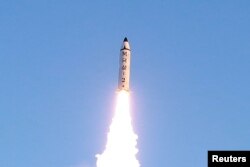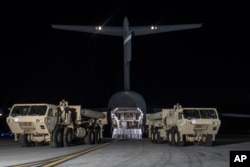China’s foreign minister has warned that the United States and North Korea are on a collision course, citing rising tensions on the Korean peninsula. He’s also urged both sides to take steps to de-escalate the situation.
But as Foreign Minister Wang Yi spoke out about what he described as a “looming crisis,” analysts said his remarks more than anything highlight Beijing’s waning influence over Pyongyang and events on the peninsula.
Dual suspension
Speaking with reporters on the sidelines of annual high-level political meetings, Wang Yi criticized Pyongyang for ignoring international sanctions and opposition to its nuclear and missile programs. He also argued that large scale military exercises by the United States in South Korea were also raising tensions.
“The two sides are like two accelerating trains coming towards each other, with neither willing to give way,” Wang Yi said, adding: “The question is: are the two sides really ready for a head-on collision?”
Wang called on North Korea to first end its nuclear and missile tests and for the United States to halt its military exercises in South Korea.
“This suspension for suspension can help us break out of the security dilemma and bring the parties back to the negotiating table,” Wang said.
At the same time, however, Wang tried to distance Beijing from the ongoing dispute, arguing that the nuclear issue on the peninsula was mainly between North Korea and the United States.
Lips and teeth
Wang said this even as he noted that China’s role was indispensable as ties between the two countries were as close as lips and teeth.
Analysts said such calls to return to the negotiating table ring hollow, given that North Korea has shown time and time again its unwillingness to do so.
On Monday, North Korea fired four missiles into the sea off Japan’s northwest coast, the latest in a series of ballistic missile and nuclear tests in recent months in defiance of United Nations resolutions. In response, U.S. President Donald Trump warned that the threat from North Korea had entered a “new phase.”
Although Beijing describes relations with the North as being close as lips and teeth, “the harsh reality is that Pyongyang has now acquired very sharp teeth (nuclear-armed missiles over the last two decades) and Beijing's lips are bleeding,” said Mohan Malik, a professor at the Asia Pacific Center for Security Studies in Honolulu.
In an emailed response to VOA, Malik said that given the recent killing of Kim Jong Un’s half-brother – who was under Beijing’s protection – the political relationship between Pyongyang and Beijing is at a very low point.
“Kim Jong Un is the first North Korean leader who has not undertaken a single pilgrimage to the Middle Kingdom to pay tribute,” Malik said, adding that China’s longstanding priorities on the Korean peninsula remained the same: “no instability, no war, and no nukes — in that order.”
THAAD upoar
And it’s not just North Korea that China has lost control over. It’s influence over South Korea is waning as well, given the controversial deployment of the controversial Terminal High Altitude Area Defense anti-missile system.
Wang Yi echoed China’s strong opposition to the system on Wednesday at the press briefing calling on Seoul to halt the system’s deployment and arguing that the move was “not the way neighbors behave.” China argues that the anti-missile defense system is a threat to its security.
But, despite calls for China to deliver punishing economic sanctions to South Korea over its decision to deploy the system, there is little Beijing can do to reverse the decision, said Ding Xueliang, a professor at Hong Kong University of Science and Technology.
“Beijing used to be regarded by South Korea as the only foreign country that could exercise some influence on Pyongyang, but after so many years after so many efforts have been put into this process (six-party talks), North Korea has still been doing what it wants to do,” Ding said.
“South Korea has been terribly, terribly frustrated for so many years. Then, (Seoul) concluded that even if the PRC is so strongly, so angrily against the THAAD system, they have to do it.”
Increasingly isolated
As one of isolated North Korea’s few supporters, the international community has long looked to Beijing to help resolve ongoing tensions on the peninsula. But, China has consistently rejected suggestions from countries such as the United States and others that it could be doing more.
North Korea’s erratic behavior in recent months, has made it increasingly difficult for any country to talk with Pyongyang, analysts said.
But that doesn’t mean that change is unlikely.
Mohan Malik, of the Asia Pacific Center for Security Studies, believes change is inevitable, sooner or later.
“I suspect that more than any other capital, Beijing has its ears close to the ground in Pyongyang and the PLA (People’s Liberation Army) is far more ready than others to install a Beijing-friendly regime in the event of a regime meltdown and to wage and win the next Korean war to establish its supremacy on the peninsula,” Malik said.
Given Trump’s unpredictability and view of himself as a dealmaker, the situation may not be as dire as Beijing is predicting, said Oh Ei Sun, a senior fellow at the S. Rajaratnam School of International Studies in Singapore.
“At the moment, we might perceive the situation between North Korea and the United States to be very tense, but you would never know how Trump might actually react to the situation. He might actually decide to reach out to North Korea,” Oh said. “There is actually unpredictability from both sides and it is not necessarily a train wreck,” in the making.
Saibal Dasgupta contributed to this report






